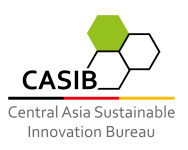On June 6th, 2022, the German Ambassador to Kazakhstan, Ms. Monika Iwersen, visited the Baraev Institute (Research Institute for Grain Cultivation) in Shortandy and was provided with information about the research activities of the ReKKS project ( http://www.rekks.eu/de/node/274) at the site. The Baraev Institute is a long-standing partner of the ReKKS project consortium and is one of the leading research institutions in the field of soil-damaging cultivation methods of grain crops in Kazakhstan. The research activities of the institute go back to the time of the reclamation of virgin land in the 50s, when extensive degradation processes, mainly due to wind erosion, began due to the arable use of original steppe areas and led to a decrease in soil fertility.
[Image: Baraev Insitiute, 2022]
The ReKKS project is carrying out extensive field tests at the site to investigate the effects of agricultural use on soil quality and soil water balance. The aim of the project, with the support of German and Kazakh scientists, the agricultural engineering company AMAZONE and the company for environmental equipment technology UGT, is to develop methods to reduce the risk of soil degradation and thus achieve positive effects on soil water balance and soil fertility. In addition to the importance of securing agricultural production, the project research also focuses on issues of climate protection and biodiversity.
The ambassador was informed about the progress of the project by the head of the institute and the head of the department for land use and soil management, Kanat Akshalov, and was shown the field tests and the wind erosion channel specially developed for the project.
[Image: Baraev Insitiute, 2022]
CASIB supports close cooperation with the German Embassy, which makes an important contribution to making CLIENT II projects even more visible and networking them effectively in the region.
- Log in to post comments
